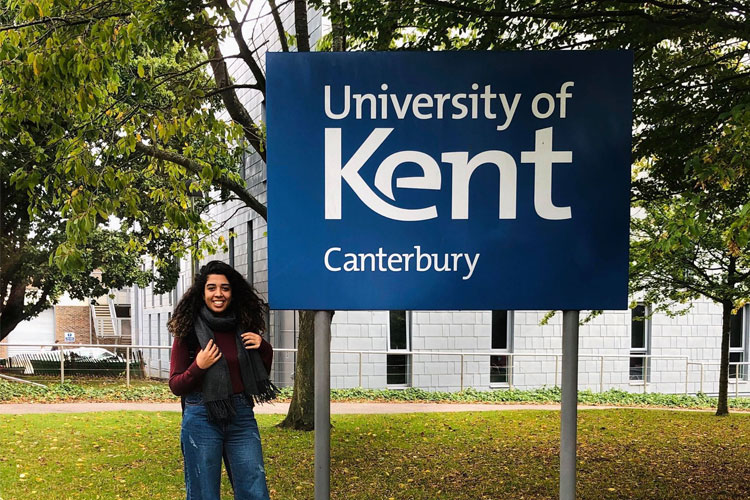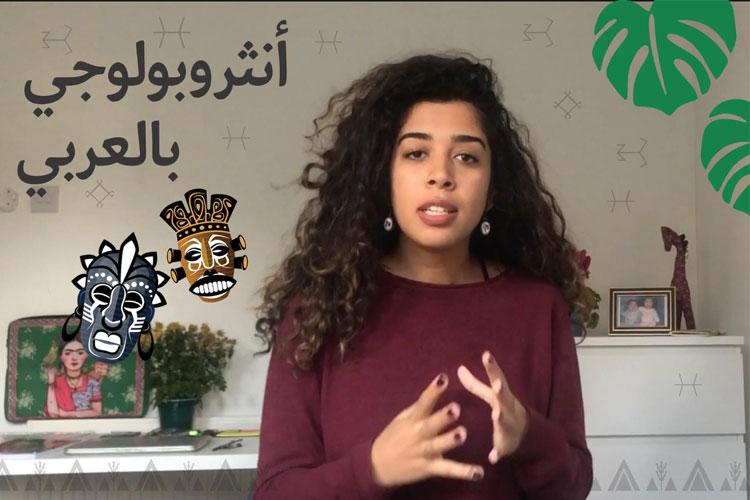Farah Hallaba has recently joined the School to embark upon an MA in Social Anthropology and Visual Ethnography. She made an informal, short video in Arabic explaining what Anthropology was to her friends in Egypt, her home country. Within 24 hours of being posted on Facebook, the video received hundreds of shares and 2.8k views on YouTube. Surprised by the success, Farah has decided to keep the momentum going and release a new episode of ‘Anthropology in Arabic’ each week, and, after uploading the second episode, was interviewed by an Egyptian newspaper.
Farah describes her journey to study Social Anthropology at Kent and what drove her to make a video in the first place:
“‘I am in my senior year in High School and, after watching your videos, I am seriously considering studying Anthropology at University.’
“This was a comment left on one of my videos in the Anthropology Bel3araby (Anthropology in Arabic) video series on YouTube. I was very moved by such a comment: it felt like I was guiding someone else into Anthropology.
“I studied Political Science and minored in Cinema during my BA studies in Istanbul. After finishing high school, Political Science seemed to be the field that I was most passionate about, but this was because, out of the social sciences I knew back then, this resonated the most. I did not know anything about Anthropology back then, but I had always been an explorer and traveller. I would save up money to go to places rich in culture and completely new to me, destinations that were off the beaten track, where few tourists travelled, and those that were sometimes described as dangerous to go even. These ‘dangerous’ places were always my favourite! I would travel solo to South-East Turkey and observe Kurdish, Arabic, Syriac and Turkish ethnicities co-existing together. If I saved up enough money, I would travel to Lebanon to observe the cultural dynamics of different sects living together or to Morocco and Tunisia to explore the culture, learn local dialects and interact with ethnic Berbers.
“After my undergraduate studies, I moved to my hometown in Egypt for a year where I researched programmes across the world to pursue a postgraduate degree. As I was doing my exhaustive search of MA programmes, I was introduced to Anthropology by underground artists and documentary-makers. Reading about it really fired my curiosity. BINGO! Discovering Anthropology seemed like finding a word I was trying to remember for years. As my search now had a focus, I came across the MA in Social Anthropology and Visual Ethnography at Kent, which seemed to be a programme customised to my interests. I enjoy socio-cultural research and I very much appreciate the visual arts.

“Although I applied and was accepted, I still did not know exactly what Anthropology was. So I can safely say my real journey with Social Anthropology started late September when I began my MA at Kent. Every lecture I took and each piece I read fascinated me! And it was then that I wanted to make use of my bilingualism and start a YouTube channel to share the knowledge I study with people from my part of the world [The Arab World]. Especially because I am bugged by how under-studied this discipline is in the region and how inaccessible resources are to study it! This is because language is a big issue: there aren’t many materials available in Arabic as most of the key texts are written in, or have been translated into, English.
“I feel privileged: I am beginning to really know what the heart of Anthropology is through studying it here and speaking a language in which I can access so much of its resources. And this is how I decided to make the Anthropology Bel 3araby series. I do not only translate some information I read or study, I try to simplify the knowledge. Anthropology may seem challenging or overwhelming at first for those who are newcomers to the discipline (like I was before). And this is why I was aware of the importance of simplifying the content to make it as relevant as possible to the audience, whom I am trying to introduce to the ‘World Of Anthropology’.
“The first video of the series went viral, very unexpectedly! It got 5,000 views in a week! This was such a motivation for me. But also it showed how many people are interested and hungry for interesting, non-academic anthropological content in Arabic. Some people know about it but are not able to comprehend texts in English: others are completely new to it and find it an interesting field.

“I add English subtitles to all my videos because I want to address as wide an audience as possible. Also, because I do not only want to share knowledge to the Arabic-speaking world, but create interesting short videos that explain the main concepts and ethnographies of Social and Visual Anthropology. In so many cases, I find academic papers challenging to read so I try to search for interesting visuals that may simplify it. So I hope to help fellow students in making knowledge more accessible through visual means, like what I did in the ‘Simplifying Liminality’ episode.
“Anthropology to me is a way to make sense of the world. It is not the study of so-called ‘primitive cultures’ as some may assume. It is very timely, concerned about cultural identity and practice of peoples. It has the capacity to look at many different aspects of human beings’ life and study their traditions, rituals and worldview. I find it a humbling discipline, mainly because it teaches the anthropologist how not to be ‘ethnocentric’, that is looking at other cultures from the perspective of your own culture, and appreciate the diversity of fundamental perceptions that exist elsewhere.
“I usually move with a small notebook because I regularly and spontaneously get inspired for episode ideas. If I am reading something that I can visualise as an interesting topic for an episode, if a professor creatively lectures about an important concept or if I just become animated by an idea that I can make relevant and simple to the audience, then I write it down. And later, outside of the seminar room, I prepare the script, record and edit the video.
“I aim to release a new episode on a weekly basis so stay tuned for Anthropology in Arabic!”
The episodes are also available via Farah’s Facebook and Instagram pages.

